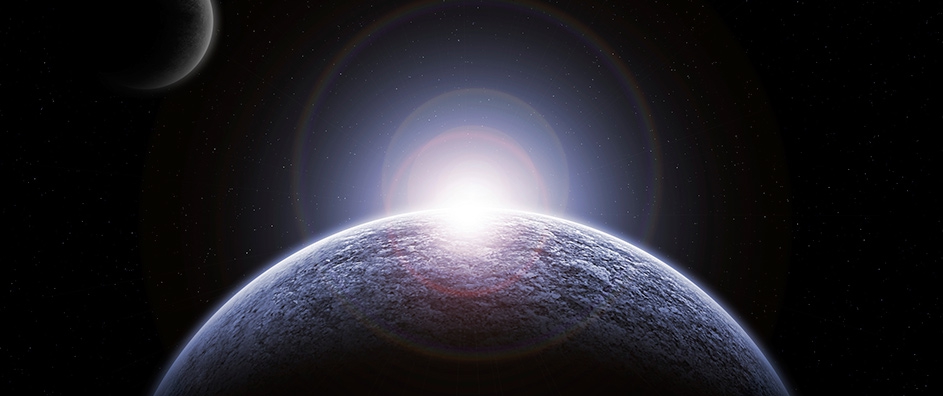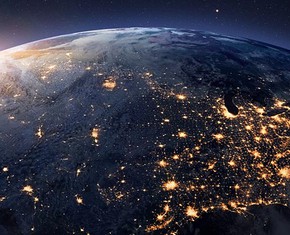The views expressed in our content reflect individual perspectives and do not represent the authoritative views of the Baha'i Faith.
During the 2006 Beyond Belief conference (a gathering devoted to the exploration and promotion of a secular worldview), Dr. Caroline Porco spoke about awe. Specifically, she wondered how a religious believer’s awe of God could be replaced with awe of scientific discovery. In the course of her remarks, she noted that Enceladus, one of Saturn’s moons, has conditions conducive to the development of life. Later, an article commented on her presentation:
If it is ultimately found that life has developed twice in this solar system alone, we can assume it has occurred a staggering number of times in the cosmos as a whole – and such a finding would prove, in Porco’s understated words, “very difficult for religious doctrine.” — Bob Avakian, Beyond Belief 2006 Conferenec
The comment made me smile. As a Baha’i and a science fiction writer, it seems a peculiar assertion only a bit less absurd than the implicit assumption that religious people are not, in fact, in awe of science, the Universe in which we live, or the complexity of life.
Analog magazine has published most of my science fiction stories, and I frequently write about humanity’s first contact with another sentient species. I fully expect that someday we will meet other races of beings who, however different they may appear, will have rational souls and intellects capable of reason and abstract and creative thought—beings just as human as us. Why should that idea shock us?
As a teenager—even as a child of the Star Trek era—I wasn’t convinced of the reality of life “out there” until I read the Baha’i scriptures on the subject. It seemed logical that, if more solar systems like our own existed, we might find life there. But the scientific wisdom of the time maintained the Universe was inhospitable to life, and Earth a cosmological fluke. Yet, in the last half of the Nineteenth Century, Baha’u’llah, the prophet and founder of the Baha’i Faith, wrote:
Every fixed star hath its planets and every planet hath its creatures, to the number no man can compute. – Gleanings from the Writings of Baha’u’llah, p. 163.
In fact, Baha’u’llah spoke of other worlds of God in a variety of contexts:
Know thou of a truth that the worlds of God are countless in their number, and infinite in their range. None can reckon or comprehend them except God, the All-Knowing, the All-Wise. – Ibid., p. 152.
Contextually, he is not speaking here of physical worlds of God, but neither does he exclude such worlds. Baha’u’llah’s writings also reiterate what older revelations told us—that we were created in God’s image. But what, precisely does this mean? Does it mean that God is a superior version of a bipedal hominid with bilateral symmetry who is, presumably, perfect in every way? Hardly.
Christ says that God is a Spirit, not a material being, an assertion that Baha’u’llah elaborates on in a number of places in his writings. In this context, I understand Baha’u’llah’s words about what makes us human:
Veiled in My immemorial being and in the ancient eternity of My essence, I knew My love for thee; therefore I created thee, have engraved on thee Mine image and revealed to thee My beauty. – The Hidden Words, p. 4.
So from a Baha’i perspective, God’s image is a spiritual one, a rational one, not a material collection of atoms. When we meet the alien and find she is us, it will not be her physicality that we will recognize as human, but her capacity to ask questions and explore the Universe—both inner and outer—for answers. In other words, we will recognize her capacity to do science—and art.
A Baha’i journalist friend told me of a visit she made to the Holy Land when Shoghi Effendi, the great-grandson of Baha’u’llah and appointed Guardian of the Faith, was alive. She and several other Baha’is were eating a meal with him when the subject of Baha’u’llah’s words about life on other worlds came up. One of the pilgrims asked Shoghi Effendi, “When we meet people from other worlds, will we teach them the Faith?”
Shoghi Effendi smiled and said, “Maybe they will teach us the Faith.”
Baha’is call this a “pilgrim’s note,” meaning it’s not authenticated or authoritative, but my friend thought that, as a Baha’i science fiction writer, I’d appreciate it. I did. It led me to write some of my favorite stories, some included in the Juxta Publishing collection entitled I Loved My Creation.
Many Baha’is, such as my friends Stephen and Dinesh (both physicists), Lisa (a biologist), and my son Alex (who teaches middle-school physics), have gone into the physical sciences, encouraged by the scriptures of our Faith. Baha’is are exhorted to lives of service, are taught that work done in the spirit of service is accounted as worship in the sight of God, and are assured that the sciences and arts are crucial to the progress of humanity:
Knowledge is as wings to man’s life, and a ladder for his ascent. Its acquisition is incumbent upon everyone. The knowledge of such sciences, however, should be acquired as can profit the peoples of the earth… Great indeed is the claim of scientists and craftsmen on the peoples of the world. – Baha’u’llah, Epistle to the Son of the Wolf, p. 26.
Between Baha’u’llah’s injunction to seek knowledge, his elevation of arts and sciences, my friend’s anecdote, and my love of words, writing science fiction instead of merely daydreaming about journeys in outer space and time seemed a no-brainer. Indeed, it is largely due to Baha’u’llah that I stand in awe of scientific discovery and dream of meeting human beings from other worlds.
All of which reminds me of another bit of scripture:
At every moment he beholdeth a wondrous world, a new creation, and goeth from astonishment to astonishment, and is lost in awe at the works of the Lord of Oneness. – Baha’u’llah, The Seven Valleys, p. 32.
You May Also Like
Comments

















Regarding the passage on p. 163 of the ‘Gleanings‘; the creatures which Bahá’u’lláh states to be found in every planet cannot be considered to be necessarily similar or different from human beings on this earth. Bahá’u’lláh does not specifically state whether such creatures are like or unlike us. He simply refers to the fact that there are creatures in every planet. It remains for science to discover one day the exact nature of these creatures.
(Shoghi Effendi, Lights of Guidance p. 478)
Tablets of Baha'u'llah page 188
Man thanks for the post.
Do you know where i can find the particular pilgrims notes referring to the beloved guardian's comment?
‘Abdu’l-Bahá stated there are other worlds than ours which are inhabited by beings capable of knowing God.
(Shoghi Effendi, The Light of Divine Guidance v II, p. 79)
Lawrence is correct, Dr Greers work is pretty cool. Its important for anyone investigating the truth to seek out all sources of work from ...different peoples and perspectives and come to one that feels right in your soul. Be discerning. I didn't know about Dr Greer until after my experience in 2012, however it was so life altering i had to research and find out more.
I suggest if anyone is wanting to seek out UFOS and their inhabitants that frequent our space, ask why? If you feel they have something to say or give to you that may help your life, ask them to show you! :D
I am always here to talk if any Baha'i is struggling with their experiences. I too had a hard time afterwards trying to figure out why, etc. xx